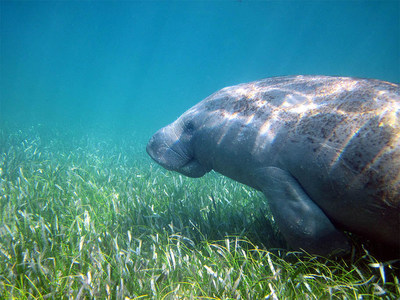WINTER GARDEN, Fla. , June 4, 2021 /PRNewswire/ -- Today, Florida aquatic restoration company Sea & Shoreline announced the planting of their one-millionth seagrass/SAV plant in honor of World Environment Day on June 5th . Reaching this monumental milestone, Sea & Shoreline, a carbon negative company, has planted more plants in fresh, brackish, and marine environments than any other company in the world. The company's one million plants, rooted in waterways across Florida, equate to over 130 acres of seagrass/SAV plantings. To put it into perspective, the ground cover (not taking into account the "halo effect" of plants expanding outside planted areas, which often leads to exponential growth) is larger than The Magic Kingdom at Walt Disney World (107 acres) and equal to 95 football fields - over three times the amount of NFL team stadium fields (30) in the United States .

In addition to the 130 acres planted to date, future phases of current projects will soon allow Sea & Shoreline to plant an additional 60 acres or 300,000 plants.
These submerged aquatic plants provide critical ecosystem services such as food and habitat for a wide variety of fish and animals, water clarity enhancement for anglers and tourism, sediment stabilization to protect coastlines from storms, oxygen production for sea life, and carbon and nutrient sequestration, all of which can transform algae-dominated aquatic ecosystems into ones that are healthy and thriving.
The company's dedicated efforts to create thriving aquatic environments are timely and critical as federal officials have declared an unusual mortality event for Florida's manatee population. More than 700 manatees have died in Florida so far this year, more than double the average. An immediate need for seagrass/SAV replenishment, their primary food source, will save sea life according to state veterinarians* and the Florida Fish and Wildlife Conservation Commission. **
"We're excited to part of the solution that enhances Florida's water quality and provides a sustainable food source for our manatees," said Sea & Shoreline CEO Jeff Huenink .
In addition to enhancing environmental ecosystems with seagrass/SAV and educating communities and governments on how it saves sea life, Sea & Shoreline's services remedy many factors that corrupt aquatic environments. Since its inception in 2014, Sea & Shoreline has completed over 150 projects including oyster and coral reef restorations; berm and bank stabilizations; and dredging to remove muck and pollutants, allowing sunlight to reach seagrass and other underwater plants so they may flourish.
The company is starting two new restoration projects this week in Florida . One in Lake Istokpoga and another in St. Andrews Bay, both of which were awarded to Sea & Shoreline by the Florida Fish and Wildlife Conservation Commission. Other recent restoration projects include (with multiple additional contracted projects in the works to be announced soon):
- Kings Bay Restoration ( Crystal River, FL )
- Homosassa River Restoration Project ( Homosassa, FL )
- Banana River/Indian River Lagoon Restoration ( Umatilla, FL )
- Tucker Cove /Indian River Lagoon Restoration ( Fort Pierce, FL )
- Caloosahatchee River Valued Ecosystem Component Restoration ( Lake Worth, FL )
- Lake Walk in Water Restoration ( Lake Wales, FL )
- Brevard Zoo Restoration ( Melbourne, FL )
- Moore's Creek Restoration ( Fort Pierce, FL )
- Florida Power & Light Turkey Point Cooling Canal System Restoration ( Homestead, FL )
- Lake Trafford Restoration ( Immokalee, FL )
For more information about Sea & Shoreline, its "Seagrass Saves Sea Life" campaign, and how communities and corporations can take part in this global initiative, please visit seaandshoreline.com or follow the company on social media LinkedIn I Facebook I Instagram I YouTube
* "Some Florida manatees still struggle with starvation after peak die-off. Seagrass loss is to blame, a state veterinarian says, and it's not easy for surviving manatees to recover."
Source: Tampa Bay Times , May 19, 2021
** "Preliminary information from the Florida Fish and Wildlife Conservation Commission (FWC) shows a reduced food supply is contributing to the high death count. Manatees eat seagrass. One of their homes is the Indian River Lagoon, where 46,000 acres of seagrass have been lost since 2009. The FWC says environmental conditions in the lagoon remain a concern."
Source: WusfNews.com, May 30, 2021
Contact: Heather Herold
heather@seaandshoreline.com
(321) 626-6760
 View original content to download multimedia: http://www.prnewswire.com/news-releases/sea--shoreline-plants-one-millionth-seagrass-plant-to-save-sea-life-301305818.html
View original content to download multimedia: http://www.prnewswire.com/news-releases/sea--shoreline-plants-one-millionth-seagrass-plant-to-save-sea-life-301305818.html
SOURCE Sea & Shoreline, LLC